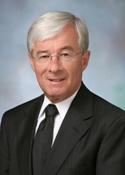Floyd D. Gaibler has joined the U.S. Grains Council as director of trade policy at the Washington, D.C., headquarters office. In his role, he will work with government officials and the White House to address policy issues related to the export of U.S. feed grains and their co-products.
Prior to joining the Council, Gaibler served as Deputy Under Secretary, Farm and Foreign Agricultural Services at the U.S. Department of Agriculture. In that position, he provided leadership and guidance to programs administered by the Farm Service Agency, the Commodity Credit Corporation, the Risk Management Agency and major international and food trade issues affecting the Foreign Agricultural Service.
Gaibler brings more than 25 years of experience working on agricultural, food and trade policy issues in both the executive and legislative branches of the U.S. federal government and the private sector. Born and raised on the family farm in Farnam, Neb., Gaibler has an M.S. and B.S. in agricultural economics from the University of Nebraska.
“Mr. Gaibler brings to the Council a great deal of experience and expertise in the area of trade policy and government affairs,� said USGC Vice Chairman Terry Vinduska of the Kansas Corn Commission. “As a result, the U.S. grain producer will see a significant benefit from the Council’s more active role in addressing trade policy issues.�
According to Gaibler, a priority issue for his work is educating the Administration and Congress on the importance of ratifying existing trade agreements with Panama, South Korea and Colombia.
“Colombia is critical. Due to the lack of ratification of the Colombia Trade Promotion Agreement, the United States is unable to compete on a level playing field. This is because of continued import duties on feed grains and co-products and trade preferences provided to competitors as a result of Colombia’s trade agreement with South American countries,� he said. “As a result, there has been a sharp loss in U.S. export sales to Colombia, particularly in corn last year.�
Gaibler said other issues he is working on include identifying and eliminating barriers affecting the export of feed grains and co-products.
“International trade is becoming increasingly complex and important in a global economy,� he said. “U.S. agriculture must continue to maintain and nurture existing markets, while becoming more innovative and pro-active in identifying and developing new potential growth markets and opportunities.�
Written by Jodi Kiely, USGC Contributing Writer


